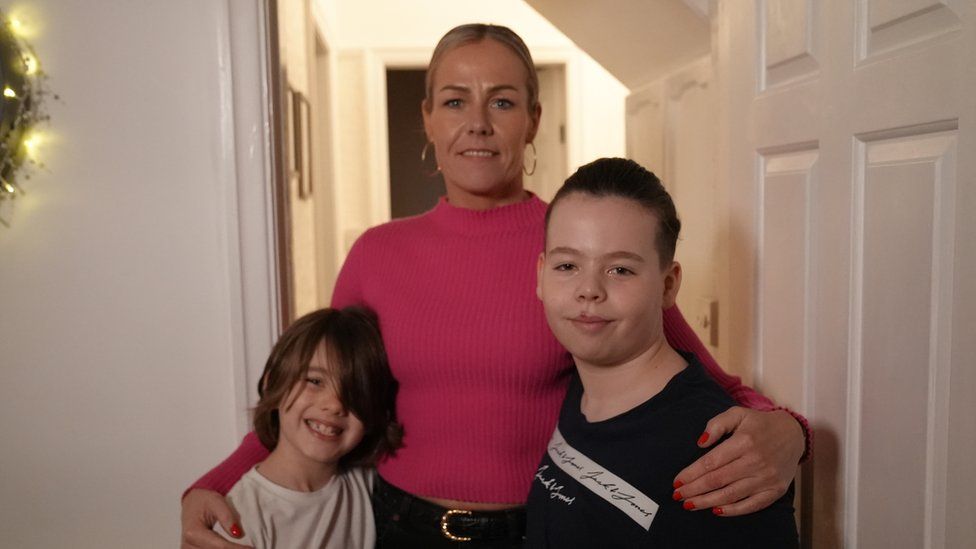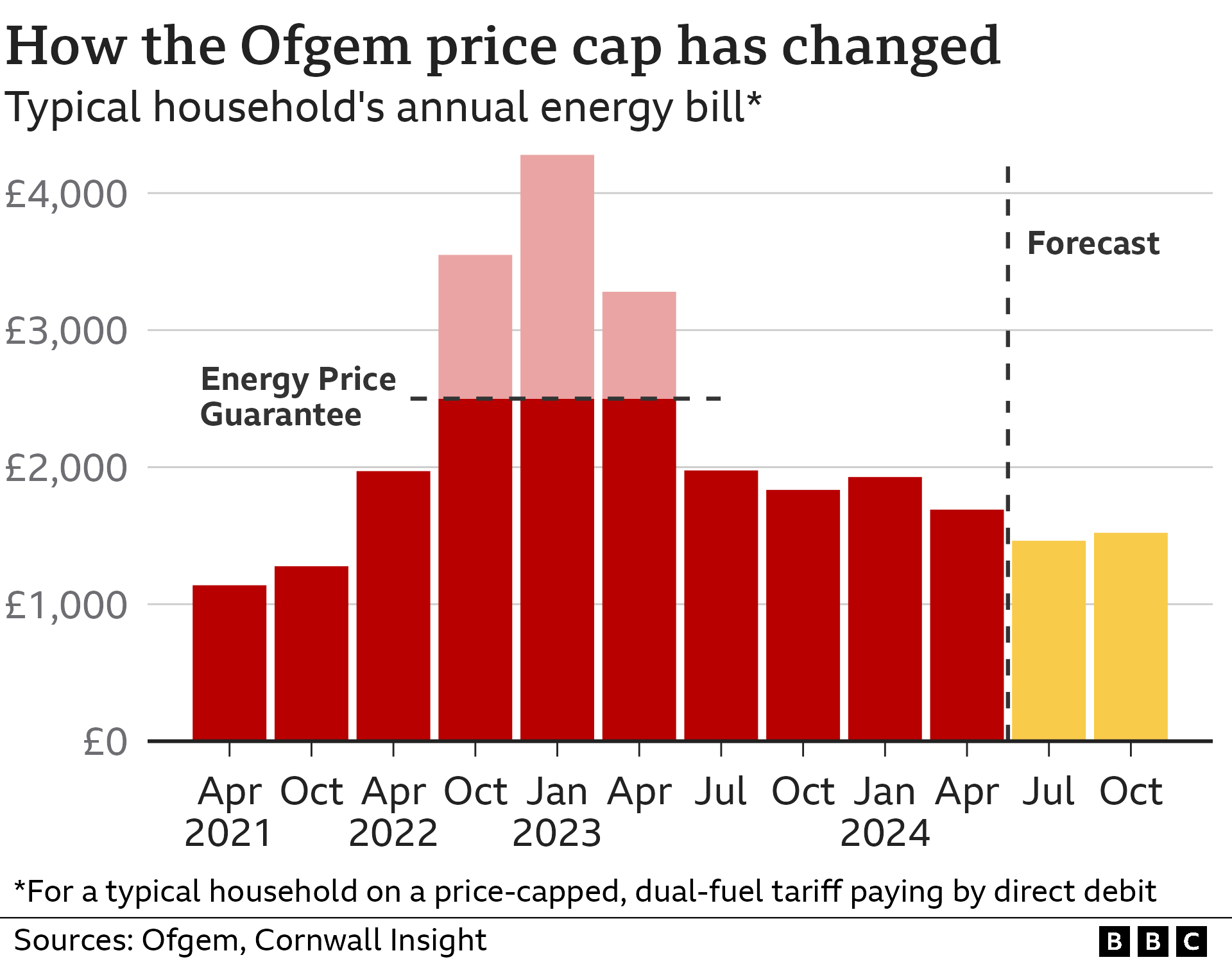
The typical annual energy bill will fall to £1,690 from April to the lowest for two years under the new price cap set by the regulator.
It means a drop of £238 a year, or around £20 a month, for a household using a typical amount of energy.
Lower wholesale prices paid by suppliers have led to the cut in the price cap for April to June, which will bring some relief to billpayers.
But campaigners said bills are still high and many will struggle to pay.
Energy prices are now at their lowest level since Russia's full-scale invasion of Ukraine in February 2022. However, even after April's drop, bills will remain well above pre-pandemic levels.
The regulator's price cap affects 29 million households in England, Wales and Scotland. Rules are different in Northern Ireland, where prices are also falling.
Ofgem sets the maximum amount suppliers can charge for each unit of gas and electricity but not the total bill - so if you use more, you will pay more.
Specifically, in England, Wales and Scotland:
- Gas prices will be capped at 6p per kilowatt hour (kWh), and electricity at 24p per kWh. That compares to the current gas price of 7.42p per kWh and 28.62p per kWh for electricity
- Households on prepayment meters will pay slightly less than those on direct debit, with a typical bill of £1,643
- Those who pay their bills every three months by cash or cheque will pay more, with a typical bill of £1,796
- Standing charges - a fixed daily charge covering the costs of connecting to a supply - have risen to 60p a day for electricity and 31p a day for gas, although they vary by region
The regulator will add £28 to everyone's bill over a year to cover the cost of dealing with £3.1bn of debt that customers owe to suppliers.
Energy firms will contact customers before April to inform them of the new prices.
However, whether customers' direct debits fall automatically may depend on whether they have a surplus balance with their energy supplier. If people feel they are paying too much they should contact their supplier to discuss cutting payments.
Dame Clare Moriarty, chief executive of Citizens Advice, said: "It's good news that the cost of energy is falling, but the impact of sky-high prices will be felt for years to come."
'I wear as many clothes as possible'

Families - like mum Sam, from Greater Manchester, and her sons Reuben, eight, and Jenson, 10 - have been working hard to keep bills down by cutting their energy usage.
"I put the heating on in the morning, just to give it a little blast when the boys get up and then maybe at the evening time just for an hour, but we just try and cut back as much as possible. And I wear as many clothes, coats and things, as I can especially when I'm working from home.
"The boys are very aware of it because we talk openly about it," she said. "That's why, as much as they do think I'm always nagging them, it's just about trying to save money and save on energy."
She said that the lower prices would take the pressure off and give "a little bit of room in the budget" but they would continue to save energy as much as they can.
The fall in energy prices has raised the prospect of suppliers trying to attract new customers by offering improved deals.
Richard Neudegg from online price comparison website USwitch said: "We expect there to be increased competition on the market now prices are set to fall in April."

The vast majority of people pay by direct debit, with payments smoothed out over the year. However, those who pay via prepayment meter - so pay for energy as they use it - would have benefitted more had the cut come over the winter.
Ofgem chief executive Jonathan Brearley said that by April, energy bills for the average household will have fallen by £690 since the peak of the crisis.
"But there are still big issues that we must tackle head-on to ensure we build a system that's more resilient for the long term and fairer to customers," he said.
Speaking to the BBC's Today programme, Mr Brearley said the regulator was looking at standing charges - a fixed daily amount which covers the costs of connecting to a supply.
There has been criticism about increases to these charges, and some have argued they should be abolished.
But Mr Brearley said the issues were complex: "The analysis we've done says there's a large group who are made somewhat better off [by abolishing it], but there's a big but slightly smaller group who are made significantly worse off."
Support wound down
In the winter of 2022-23, overall energy prices were high and rises would have been bigger had it not been for the government's Energy Price Guarantee limiting the typical bill to £2,500.
Each household also received £400 of support over six months, but the government did not repeat the discount this winter.
Cost-of-living payments seem set to end following a final instalment this month, and no plans have been announced for a continuation of the Household Support Fund, which councils use to offer direct support.
Chancellor Jeremy Hunt could choose to address future support when he presents his Budget on 6 March.
A spokesman for the Department for Energy Security said: "We've halved inflation and energy prices are now significantly lower than their peak - but we recognise the challenges families are still facing."
Labour's shadow energy secretary, Ed Miliband, said: "Whilst it is welcome the price cap is coming down, the truth is that energy bills are still far too high for hardworking families."

What can I do if I can't afford my energy bill?
- Check your direct debit: Your monthly payment is based on your estimated energy use for the year. Your supplier can reduce your bill if your actual use is less than the estimation.
- Pay what you can: If you can't meet your direct debit or quarterly payments, ask your supplier for an "able to pay plan" based on what you can afford.
- Claim what you are entitled to: Check you are claiming all the benefits you can. The independent MoneyHelper website has a useful guide.


The BBC News Channel will be answering your questions from 12:30GMT today about the energy price cap.
This is your chance to ask us anything and we'll answer as many questions as we can.
Send us your questions by emailing: haveyoursay@bbc.co.uk.
You can also send your questions in the following ways:
- WhatsApp: +44 7756 165803
- Tweet: @BBC_HaveYourSay
- Email: YourQuestions@bbc.co.uk
- Or fill out the form below
- Please read our terms & conditions and privacy policy
If you are reading this page and can't see the form you will need to visit the mobile version of the BBC website to submit your question or send them via email to YourQuestions@bbc.co.uk. Please include your name, age and location with any question you send in.
Related Topics
https://news.google.com/rss/articles/CBMiLGh0dHBzOi8vd3d3LmJiYy5jby51ay9uZXdzL2J1c2luZXNzLTY4MzUzNjI30gEA?oc=5
2024-02-23 10:36:52Z
CBMiLGh0dHBzOi8vd3d3LmJiYy5jby51ay9uZXdzL2J1c2luZXNzLTY4MzUzNjI30gEA
Tidak ada komentar:
Posting Komentar